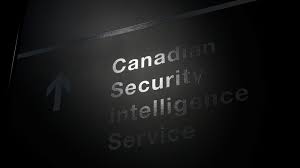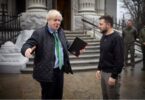Andrew Mitrovica
This is the tale of two men who risked their lives as veteran police officers to serve their country only to have their life’s work and loyalty to Canada smeared by spies. Paul McNamara, a 62-year-old former Vancouver Police Department undercover officer, and Peter Merrifield, a 57-year-old Royal Canadian Mounted Police (RCMP) officer and ex-soldier, shared their stories with me because they want Canadians and, more particularly, the Canadian government, to finally hold this nation’s spies accountable for the profound and lasting damage they have done.
McNamara and Merrifield – in addition to several Canadian politicians of Chinese descent – have had their allegiance to the maple leaf sullied by spies who enjoy the comfort of anonymity. They are victims of a dangerous hysteria gripping Canada over the scope and nature of Chinese interference in Canadian elections and society, ginned up by scoop-thirsty reporters and timorous spies who do not give a damn about the human costs of their sinister handiwork.
As I have written previously, that hysteria reeks of the old “yellow peril” canard that casts near blanket aspersions about the devotion to Canada of the Chinese-Canadian community.
It all began shortly after David Vigneault, the director of Canada’s domestic spy agency, the Canadian Security Intelligence Service (CSIS), declared in 2018 that the spies under his command would focus on the threat China posed to the country.
Anxious to show that they were up to the pressing task, Vigneault’s inept charges fixed their crosshairs on several individuals. They targeted a number of Chinese-Canadian politicians because of their ethnic background and McNamara and Merrifield because they knew, and on rare occasions met with, a former Canadian law enforcement officer turned security consultant whom CSIS apparently considers a Chinese-paid collaborator. McNamara and Merrifield are proof that guilt by association is still standard practice at CSIS, decades after Canada’s intolerant spies routed Canadians from their government jobs because of their left-wing politics or homosexuality. The miscarriage of fairness and decency visited on McNamara and Merrifield stands as a warning to the gullible politicians and reporters who treat Canada’s spy service with deference and respect, rather than the swift censure and condemnation it deserves. Here are their cautionary stories.
Paul McNamara spent 26 years as a police officer in Vancouver, British Columbia. For much of that time, he played the role of a crook to ensnare crooks. He did the risky job well. So, having done his public duty, McNamara retired from the police in 2016 and joined a US firm that provided security for America’s consulates and embassy in Canada. It was sensitive, high-paying work that required top-secret security clearance.
In October 2019, McNamara visited Guangzhou, China to try to buy a six-lane, 25-metre above-ground swimming pool for his young daughter, Holly, a competitive, “open-water” swimmer who, one day, hoped to represent Canada at the Olympic Games. McNamara says his bosses and the US State Department gave him the OK to go since the pool was much cheaper in China.
He did not know it at the time, but this fatherly act of generosity and love would soon be twisted into a pretext to strip him of his top-secret clearance and job and call into question his fidelity to Canada. While he was in Guangzhou, McNamara says he spoke briefly by phone to the ex-cop whom CSIS had its wary eyes on and who was a casual friend. That fateful call would have blunt repercussions.
In early November 2021, McNamara says he had to submit to a standard security clearance review that involved all Canadian and US law enforcement and national security databases, including CSIS. All the checks, apart from CSIS, were completed quickly. As part of the review, McNamara says he was interviewed at length at the US Consulate in Vancouver. Two days later, his security clearance was renewed, although the CSIS check was still not complete. On December 21, McNamara was told that his security clearance had been revoked by the State Department due to “derogatory information [that] was discovered”. McNamara was stunned and bewildered. Suddenly, he was out of work. Worse, perhaps, he was now deemed a potential national security risk. McNamara went searching for answers. He says a well-placed source told him that he was let go abruptly as a result of information “sensitive in nature in relation to national security”. McNamara is convinced that, all along, CSIS was behind the spurious suspicions about his phantom ties to China. He never received the results of his CSIS check.
“All roads lead back to CSIS,” McNamara says. Still, in July 2022, McNamara received a letter from CSIS, saying that it had “reviewed” and made the “appropriate internal inquiries” and found that the service was “neither responsible for, or involved in” the “circumstances you describe”. McNamara doubts what CSIS says. He has good reason to be sceptical. In July 2020, Federal Court Judge Patrick Gleeson confirmed as much in a blistering decision slamming CSIS officers for repeatedly lying while asking for the court’s approval to issue the service special search warrants. Gleeson scolded CSIS – to put it charitably – for “a degree of institutional disregard for – or, at the very least, a cavalier institutional approach to – the duty of candour and regrettably the rule of law”. But Canada’s security-intelligence infrastructure was not done with McNamara just yet.
In February 2023, McNamara says he was grilled for two hours by an RCMP officer attached to the federal police force’s Integrated National Security Enforcement Teams or INSET. McNamara was accused of having been introduced to senior Chinese government officials during his trip to China in 2019 and having met with, and had his expenses paid for, by the ex-officer connected to the Chinese. He says all of that was false, too. These accusations have taken a toll on McNamara – financially and emotionally. His once secure future has been replaced with uncertainty and doubt. Given his age and the scurrilous questions surrounding his patriotism, McNamara can’t find work. He has applied for more than a dozen jobs to no avail. A modest pension is his only source of income. A deep depression set in for a long while. Uncertainty turned into emptiness.
Still, McNamara is intent on clearing his name and reputation and making sure that other Canadians do not suffer the same surreal fate. “I am evidence of the damage that they [CSIS] can do,” McNamara says. “I have lost faith in my country.” Like McNamara, Peter Merrifield, a short, stocky firearms instructor, has devoted his life to protecting Canada and Canadians from harm not only from bad seeds, but “bad” state actors. A renowned RCMP investigator, Merrifield’s impressive résumé includes keeping prime ministers and visiting foreign dignitaries safe, and weapons of mass destruction out of the arsenals of Canada’s adversaries. That stellar record did not prevent Merrifield from having his higher than top-secret security clearance suspended at the behest of CSIS officers who cannot, it seems, connect beach balls, let alone dots. Merrifield’s troubles began in March 2020 when he says a pair of CSIS officers paid an unannounced visit to his home. True to form, the CSIS officers missed their mark. Merrifield wasn’t home. Later, Merrifield says he met with the intelligence officers twice. They quizzed him on his contacts with the security consultant with ties to Beijing.
Merrifield says he cooperated by telling them the truth. They were friends who had, in the past, shared a beer or two and talked about stuff that most people talk about: family, work and politics. Merrifield says he reported the meetings with CSIS to his RCMP superiors and decided that it would be best to stop having any contact with his former colleague.
In October 2020, Merrifield met with a CSIS officer to have his top-secret security clearance renewed for another five years. He treated the meeting as pro forma. Merrifield was in for a disconcerting surprise. He says he was questioned for more than five and a half hours by an agitated CSIS officer who demanded to know more about his casual “relationship” with the “compromised” ex-law enforcement officer. “There was no interest in facts,” Merrifield says. “She only wanted to support the CSIS theory which was not evidence; it was assumption and scattered pieces of intelligence.”
CSIS asked to meet Merrifield again. He obliged. Meanwhile, Merrifield waited for word about his security clearance renewal. In July 2022, Merrifield got the shocking answer. The RCMP had suspended his “Enhanced Reliability Status” based on allegations made by CSIS. Merrifield, who had already suffered a near-fatal heart attack a few years earlier, thought he was on the cusp of another. Not only that, but he believed he was going to lose a job he loved. In a letter the RCMP detailed CSIS’s charges against him. Taken together, CSIS claimed that Merrifield had sold out Canada to China for money. Over the next nine months, Merrifield did everything in his power to prove that these accusations were untrue. He says he provided the RCMP with reams of exculpatory evidence and agreed to interview after interview, where he rebutted the disastrous allegations – one by one.
By this point, Merrifield had become aware that he was not alone in having his allegiance to Canada soiled by CSIS’s flimsy web of conjecture and suspicion. Together with McNamara, Merrifield wrote to the prime minister, cabinet ministers, opposition leaders, parliamentary committees, and other oversight bodies urging them to take up their case and to hold CSIS to account. To date, they say, nobody has heeded their urgent call. On April 3, 2023, Merrifield prevailed. The RCMP’s Departmental Security Branch informed him that their “review” of the CSIS-born accusations was “complete” and that his Enhanced Reliability Status had been reinstated. In other words, Peter Merrifield is not and never has been a traitor. Paul McNamara remains in limbo, struggling to understand why he was cut adrift.
Approached for comment on the pair’s allegations, CSIS insisted that it “cannot disclose the identity of anyone who has applied for or renewed a clearance”. “What happened to us is a drive-by smear by CSIS,” Merrifield says. “And we are determined to hold the amateurs responsible for the horror we have endured to account.” Merrifield is right. Canada’s spies enjoy extraordinary powers. Often, in the sheltered shadows, they abuse those powers to make the innocent guilty. Shielded by limp, malleable politicians, they have never had to answer for the deep harm done. It is about time they did.
Aljazeera







